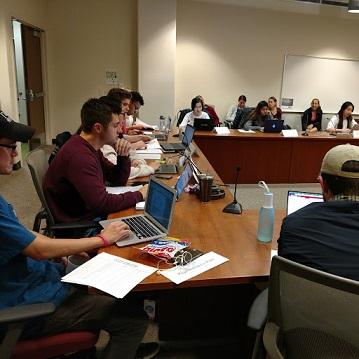Student Services Finance Committee hosted representatives from University Health Services to discuss their 2020 budget Monday.
The meeting began with Associated Students of Madison Chair Billy Welsh voicing his concerns about the current budget proposal, specifically as it related to mental health.
“I have talked to so many students about the long wait times for individual counseling,” Welsh said. “It is hard enough to admit that you need to talk to someone in a world that stigmatizes mental illness and not getting the resources that people need once they get to this point is unacceptable.”
The current UHS budget allocates for hiring two new mental health professionals as well as a part time professional. It also includes a five year forecast which would allocate funds for three new mental health professionals every year for the next six years.
UHS representative Arnie Jennerman emphasized that this growth in mental health resources is very important, as explained an increase in visits over the past five years.
“Mental health visits increased by 30.38 percent … We know we haven’t solved that issue, but it continues to grow,” Jennerman said.
A big issue for UHS lies in retaining mental health professionals, particularly those specializing in issues primarily affecting LGBTQ+ students and students of color, Jennerman said. This lack of staff has increased wait times for mental health care and is something UHS is working to address.
In the current 2018-19 budget, there is a six percent salary savings because of how many positions they have open. However, Jennerman explained that if UHS is able to fill these positions, they could be facing a deficit.
Along with these planned new hires, UHS is launching a mental health task force that will work address mental health in a way that benefits students. This task force will include professors, UHS staff and students.
Other suggestions included creating a mandatory module similar to Sex Out Loud that would focus on mental health and hiring six new mental health professionals in 2019, though this would require more space and funding.
SSFC representatives questioned UHS representatives on the high turnover rate of their mental health professionals. Jennerman said he was unsure of the underlying reasons, but suggested the unique challenges of such large scale mental health care could be a factor.
Space is another limiting factor for UHS. Jennerman said the service has just enough room to hire three more mental health professionals, but they would need to find more space before hiring any more.
There are a few options for expansion, such as remodeling the eighth floor or finding additional rental space. However, Jennerman said retention remains an issue.
Jennerman acknowledged the current UHS budget proposal would not solve the problem, but hopes it will be a step in the right direction.
SSFC will receive a tour of UHS Thursday as they consider the service’s budget further.


